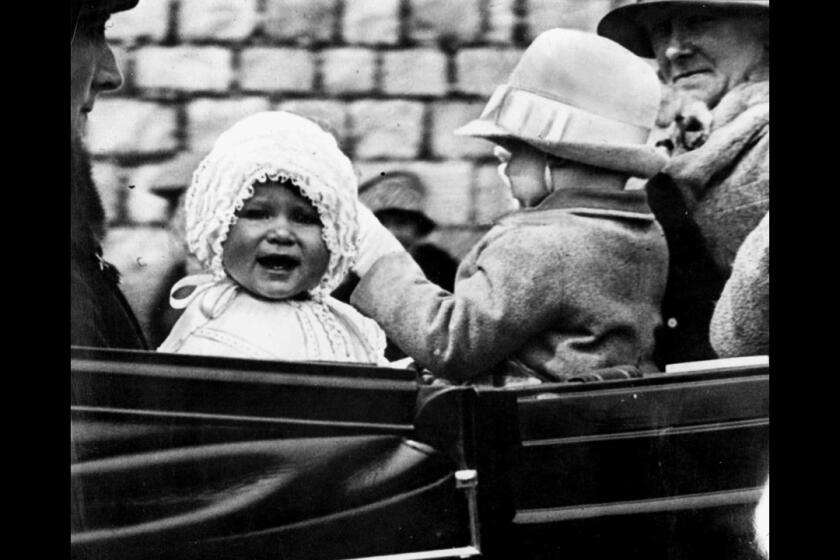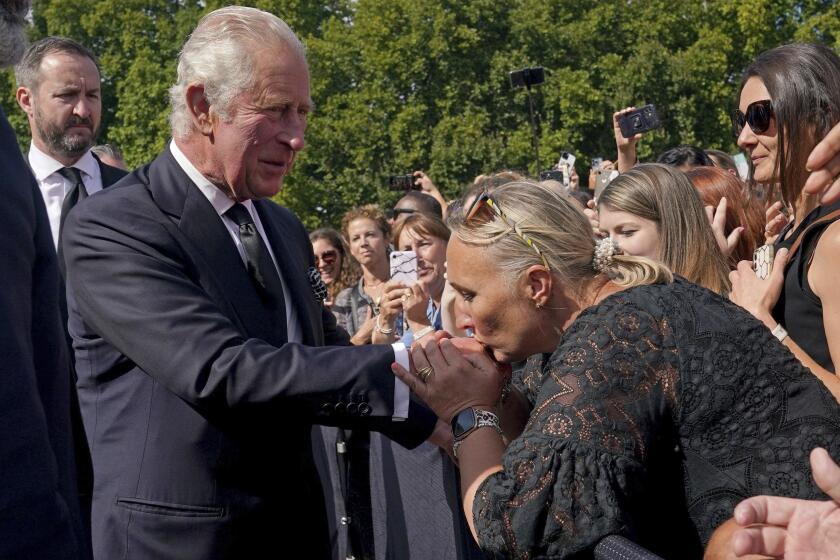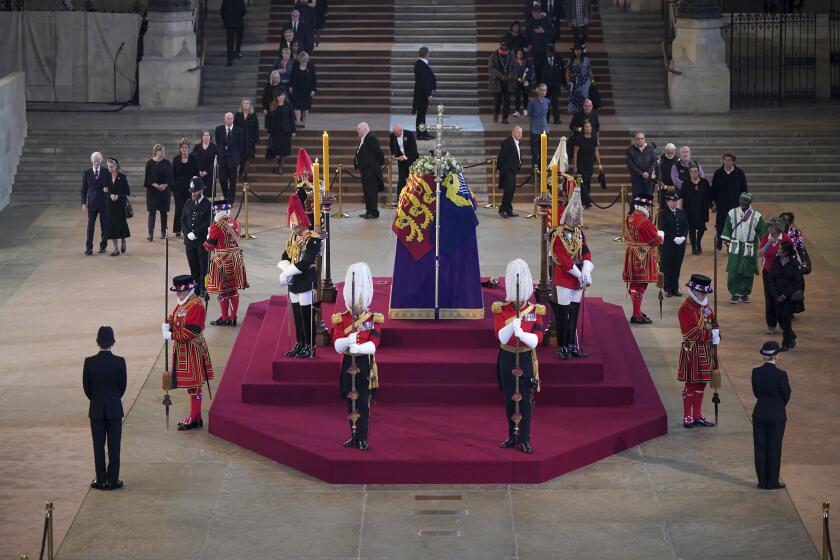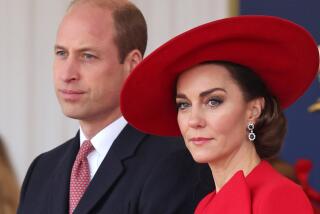Column: The real reason Americans love royalty
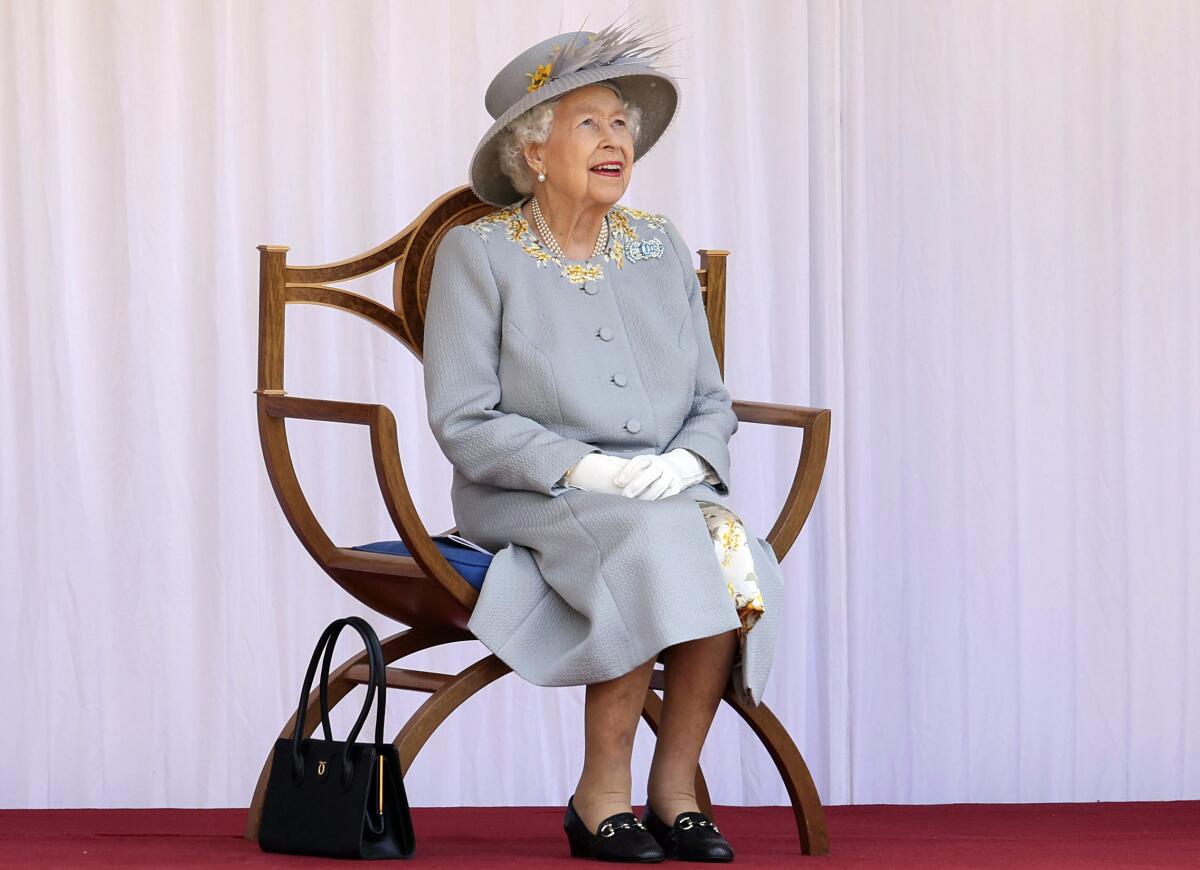
- Share via
I am American, a citizen of a country that long ago rejected monarchs and sovereigns. I have never lived under a king or a queen, and it’s difficult for me to understand why the British persist in doing so in the modern world. It seems anachronistic, inegalitarian — and oddly stiff and starchy to boot.
I’m sorry to say it while the late Queen Elizabeth is lying in state, but if the crown were to be tossed aside and the House of Windsor were to sink into the muck tomorrow, it would not bother me at all.
Still — and here’s the really strange thing — I am following the news avidly. I’m clicking on photo galleries, watching videos, reading stories. I can’t help being fascinated by the royals, and in that, I’m like millions of Americans. Even the Democrats and Republicans in Congress, who barely speak to each other, came together as Sen. Mitch McConnell (R-Ky.) offered thoughts and prayers for the queen from the Senate floor. Wall Street traders took time out from making money to bow their heads. American flags went to half staff.
Opinion Columnist
Nicholas Goldberg
Nicholas Goldberg served 11 years as editor of the editorial page and is a former editor of the Op-Ed page and Sunday Opinion section.
Why would a country that in 1776 declared its independence from an English king it called “unfit to be the ruler of a free people” still be home in 2018 to 29.2 million people willing to wake up at dawn to watch Prince Harry marry Meghan Markle? What’s this all about?
There are plenty of explanations kicking around. Some say it’s the pomp and the outlandish get-ups. Or our incurable obsession with celebrity and soap opera. Or the comfort of age-old traditions and rituals. Or the “special relationship” between the U.S. and the UK.
But for me at least — and I suspect for many Americans — the fascination is both simpler and deeper, something that goes back to childhood, permeates our culture and is not likely to disappear soon.
Because even though we divorced ourselves from the crown nearly 250 years ago, we’ve clung desperately to the mythical idea of royalty — to the legends, the stories, the glamor. From birth we’re raised on heroic kings, beautiful queens, kidnapped princesses and frog princes.
Queen Elizabeth’s death ended a remarkable 70-year rule — so long that most of Britain’s 68 million people have known no other sovereign.
For me it began with King Arthur. I was no more than 7 or 8 when I first heard the legends of the knights of the Round Table and the king of Britain to whom they were loyal, and when I first learned about the codes of honor, chivalry and bravery they supposedly lived by.
I soon became fascinated by the idea that the humdrum lives of children like me could, with the flick of a wand or a sudden revelation about secret parentage, be radically transformed. So many of the stories I was raised on were about ordinary boys and girls of no rank whatsoever who suddenly found themselves being called “Your Majesty” or “Your Royal Highness.” Like Arthur, who was entirely unaware of his royal lineage until he pulled the sword from the stone. Or the pauper Tom Canty who traded places with a prince in Mark Twain’s novel. Or Taran the assistant pig keeper in Lloyd Alexander’s “Prydain” series.
Like countless other Americans, my imagination was particularly ignited by C.S. Lewis’ Narnia stories about four ordinary English schoolchildren — two brothers and two sisters — who became kings and queens in a strange land where animals could speak and magic was real.
These fantastical worlds maintained a hold on me long after I stopped reading children’s books. So how could I not to be enthralled even decades later by the real-life story of an ordinary Los Angeles girl, Meghan Markle, who was suddenly transformed into a princess?
In addition to the ordinary people who became royal I also loved the stories of the royals who became ordinary, venturing down from their magnificent palaces to mingle in disguise among the common folk.
A rising tide of anti-royal sentiment thrusts a British throne without Queen Elizabeth into unstable territory.
There was Aragorn in “The Fellowship of the Ring,” the heir to an ancient kingdom who first appears as a “strange-looking, weatherbeaten man” in mud-caked boots as he drinks a tankard of god-knows-what at the Prancing Pony Inn.
And King Richard the Lionheart, who (in the Erroll Flynn movie version of the Robin Hood story, among other places) arrives in Sherwood Forest dressed as a monk and learns what the people really think of him.
And Audrey Hepburn as Princess Ann in “Roman Holiday,” who sneaks out of her royal lodgings and spends the evening drinking, dancing and falling in love among ordinary people in Rome.
There were echoes of all those in the story that went viral this week about Queen Elizabeth on a Scottish walking trail, not quite in disguise but not wearing her crown-and-robes either, when she met two American tourists who didn’t recognize her. Let’s just say, she handled the situation well.
The queen, with her stalwart life of mundane “service,” endless hospital visits and factory openings and famously banal receiving line chit-chat, may not be as exciting as Aragorn or Arthur. Nor is Charles. But the Windsors are among the most visible remnants of the archetype, so we cling to them as best we can.
Queues to view Queen Elizabeth II’s coffin as it lies in state at the Houses of Parliament could involve waits of as long as 30 hours.
Even though we know better. Even though we know the true story of the British monarchy is as much about conquest and empire as chivalry.
Even though Queen Elizabeth was not a swashbuckling, sword-wielding monarch. She liked horses, but she didn’t gallop them into battle.
Even though the power of British kings and queens has been mostly taken away, and all they have left are their palaces and vast wealth, their titles, pomp, tradition and factory openings.
Even though the vast majority of Americans would not under any circumstances choose to live in a monarchy.
Despite that, royalty still represents an era gone by, romanticized but not forgotten. We may live in a more mundane and less chivalric age, but we haven’t forgotten the stories.
More to Read
A cure for the common opinion
Get thought-provoking perspectives with our weekly newsletter.
You may occasionally receive promotional content from the Los Angeles Times.

